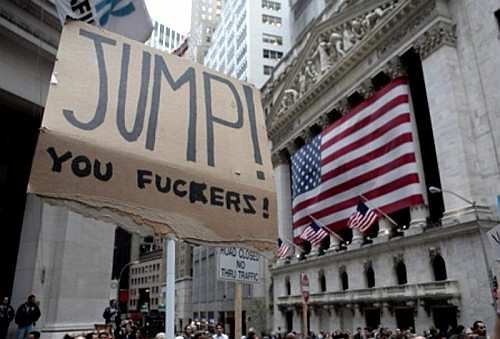Bank of England criticised following revelation of secret loans to Banks
Article published: Saturday, December 5th 2009
The Bank of England has faced a raft of criticism in the aftermath of last week’s news that it loaned a total of £61bn in secret to struggling British banks.
 Following the £500 billion emergency bailout of the banking system by taxpayer funds at the peak of the financial crisis, the Governor of the Bank of England Mervyn King allowed a further sum of £61 billion to be made made available to Scottish banks RBS and HBOS as emergency funding in the autumn of last year.
Following the £500 billion emergency bailout of the banking system by taxpayer funds at the peak of the financial crisis, the Governor of the Bank of England Mervyn King allowed a further sum of £61 billion to be made made available to Scottish banks RBS and HBOS as emergency funding in the autumn of last year.
Labour MP John McDonnell, chair of the Left Economics Advisory Panel, responded to the revelations by saying how he was “staggered at the affrontery of the Governor of the Bank of England [in risking] £61 billion of public money covertly, and without any accountability to Parliament”. Critics both inside and outside the government said at the time that it would have been more prudent to fully nationalise the banks in order to curb the risk of collapse while bringing their management under more accountable control.
Over £23.4 billion was extended to HBOS in October of last year, with evidence to suggest that the mortgage lender was close to collapse, eventually repaying the loan by January of the following year. Meanwhile, RBS borrowed more than £36 billion in the same month with the money repaid by December 16.
The question being asked is why it took over a year for this to be found out. A spokesperson for the New Economics Foundation said: “There is a real issue with transparency when its kept secret for so long, so you can understand the rationale in the initial period.” However, they added that there was “no justification for keeping it a secret for so long”.
Some analysts believe that one reason for the non-disclosure of the loans was in order to not shatter confidence in the two beleaguered financial institutions, which could have had a destabilising effect on the entire market. Although the central bank is a non-elected and non-politicised body with a policy goal of price stability, the spokesperson for the NEF still should be required to be “responsible” and “accountable” to the electorate.
The secret loan revelations have caused the government another headache along with mounting anger at the apparent return of a ‘bonus culture’ while the country remains mired in recession.
 Latest figures have shown that the RBS bonus pool has almost doubled since 2008, an increase of over £1.5 billion. The Leader of the House of Commons, Harriet Harman, recently declared that there was still a significant amount of evidence that banks were not doing enough in lending money to medium and small businesses, while at the same time continuing to make obscene bonus payments. It is the fact that such payments have been drawn from taxpayers’ money which has provoked anger among the population.
Latest figures have shown that the RBS bonus pool has almost doubled since 2008, an increase of over £1.5 billion. The Leader of the House of Commons, Harriet Harman, recently declared that there was still a significant amount of evidence that banks were not doing enough in lending money to medium and small businesses, while at the same time continuing to make obscene bonus payments. It is the fact that such payments have been drawn from taxpayers’ money which has provoked anger among the population.
Critics say that the words of City Minister Lord Myners this week that bankers need “to come back into the real world” highlight the inefficacy of government measures so far deployed to rail in the bonus culture, despite the lifeline which has been provided by the public purse.
A spokesperson for the NEF described this failure to lend to small businesses whilst paying out huge bonuses as “overstepping the mark”.
Adam Faulkner
More: News
Comments
No comments found
The comments are closed.



